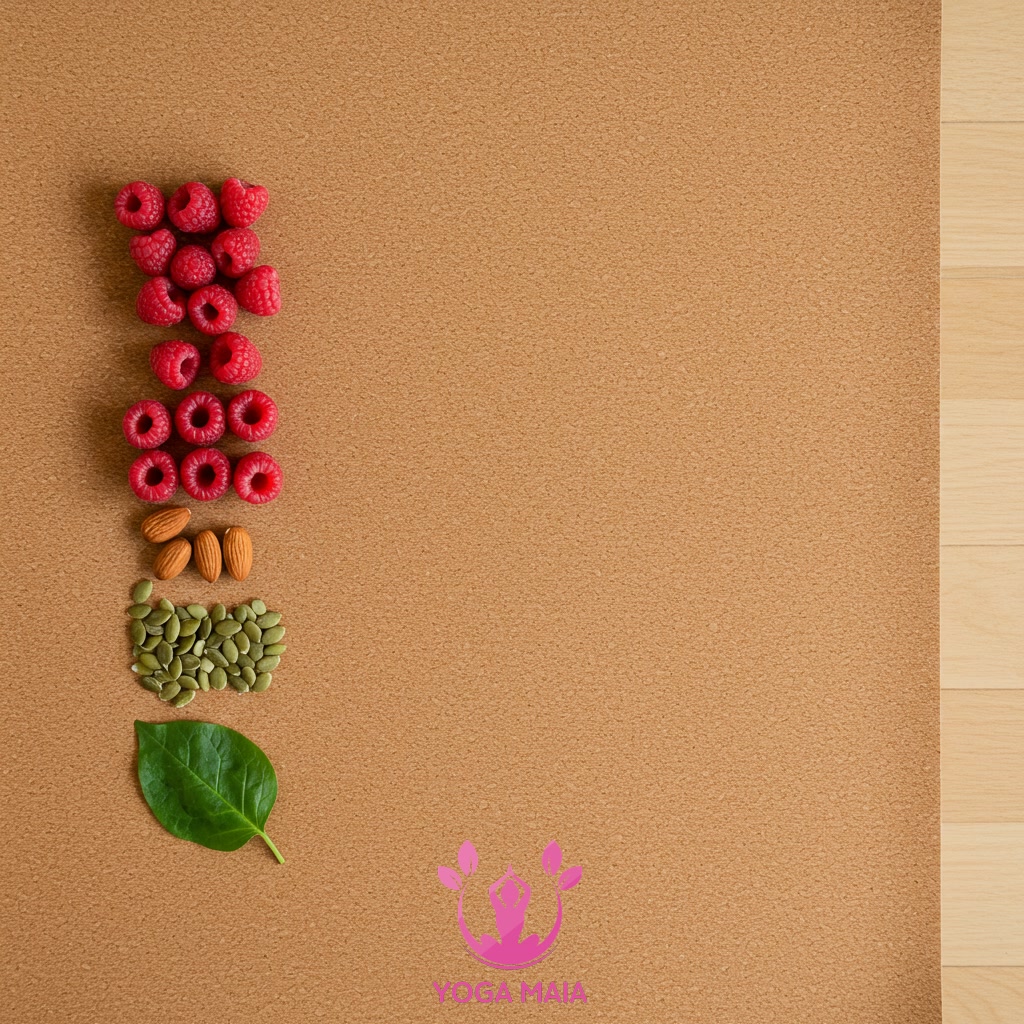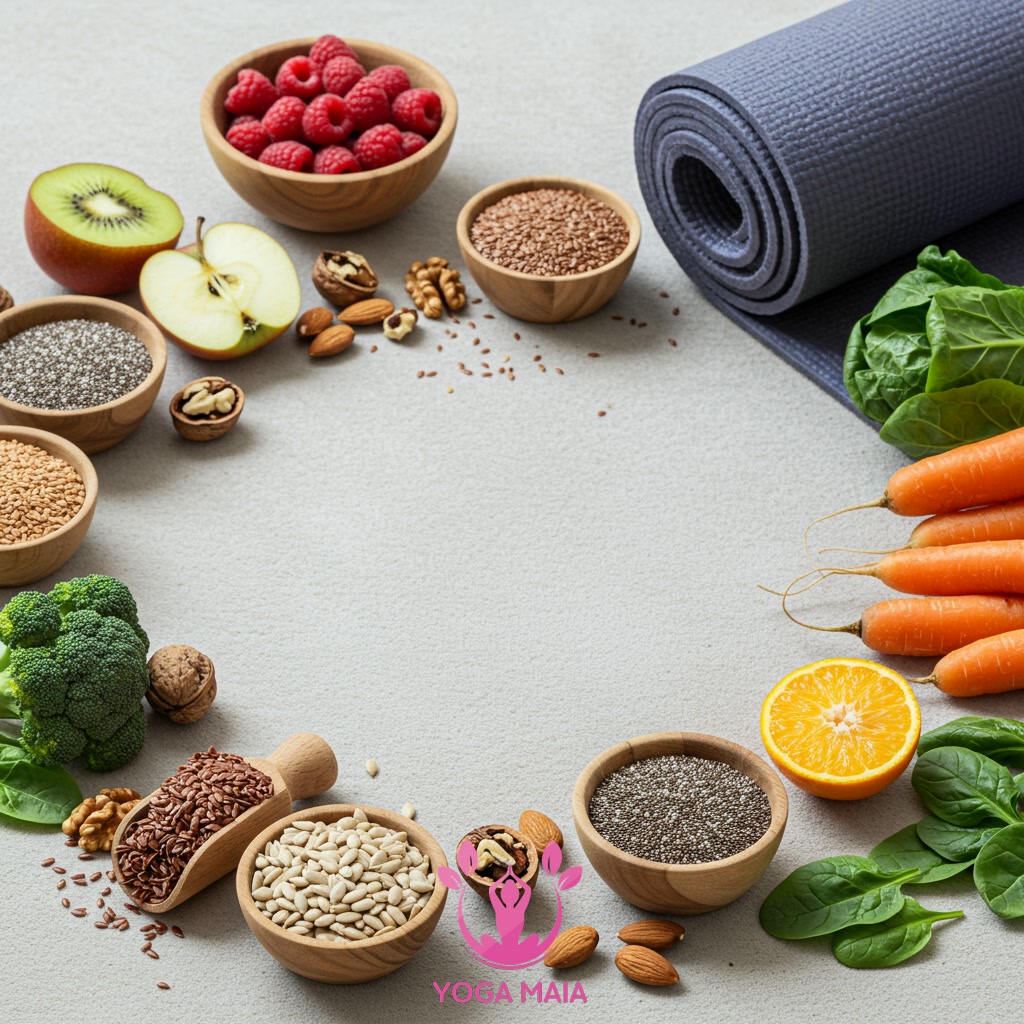Yoga Blog
Nourish Your Practice: Best Foods to Enhance Focus and Mindfulness in Yoga

This content delves into the crucial link between nutrition and the quality of your yoga practice. It highlights how specific dietary choices can significantly enhance focus and mindfulness on the mat. By exploring the best foods to consume, individuals can support a deeper and more present experience during yoga sessions. The aim is to provide practical guidance on nourishing the body to optimize mental and physical presence during practice.
Table of Contents
- Section 1: Introduction: Fueling Your Practice – Why Diet Matters for Yoga
- Section 2: The Mind-Body Connection: How Nutrition Impacts Focus and Mindfulness
- Section 3: Key Nutrients and Food Groups for Optimal Yoga Performance
- Section 4: Best Foods to Enhance Concentration and Inner Calm
- Section 5: Foods to Limit or Avoid for a Clear Mind and Comfortable Practice
- Section 6: Timing Your Meals and Hydration Around Your Yoga Sessions
- Section 7: Conclusion: Integrating Mindful Eating into Your Yoga Lifestyle
Section 1: Introduction: Fueling Your Practice – Why Diet Matters for Yoga
Embarking on a yoga journey involves more than just physical postures; it’s a holistic practice encompassing body, mind, and spirit. A often-overlooked but crucial element in enhancing your time on the mat is your diet. What you consume directly impacts your energy levels, mental clarity, and overall physical comfort during practice. Proper nourishment provides the sustained energy needed for challenging poses and helps reduce common distractions like fatigue, sluggishness, or digestive discomfort. By fueling your body with the right foods, you create a stable foundation that supports deeper focus, heightened mindfulness, and a more present experience in each pose and transition. This introduction highlights the fundamental link between nutrition and the quality of your yoga practice, setting the stage to explore specific dietary choices that can elevate your journey towards greater presence and inner peace.
 Introduction: Fueling Your Practice – Why Diet Matters for Yoga
Introduction: Fueling Your Practice – Why Diet Matters for Yoga
Section 2: The Mind-Body Connection: How Nutrition Impacts Focus and Mindfulness
Continuing from the previous section’s mention of a crucial element often overlooked: This element is nutrition, and its impact on the intricate mind-body connection is profound, particularly within the context of your yoga practice. What you consume directly influences brain function, energy levels, and emotional stability – all critical components for achieving states of focus and mindfulness on the mat. A balanced diet supports stable blood sugar, which prevents distracting energy crashes and irritability, allowing for sustained attention. Furthermore, certain nutrients are precursors to neurotransmitters that regulate mood and cognitive function. By consciously nourishing your body, you create the optimal internal environment for a calm, present mind, enabling a deeper engagement with each pose and breath.
 The Mind-Body Connection: How Nutrition Impacts Focus and Mindfulness
The Mind-Body Connection: How Nutrition Impacts Focus and Mindfulness
Section 3: Key Nutrients and Food Groups for Optimal Yoga Performance
Building upon the understanding of nutrition’s vital role in the mind-body connection, this section focuses on the specific nutrients and food groups that significantly enhance focus and mindfulness during yoga practice. Optimal performance on the mat is supported by a diet rich in complex carbohydrates like whole grains and vegetables, providing stable energy without the spikes and crashes that disrupt concentration. Healthy fats, particularly omega-3s found in seeds and nuts, are crucial for brain health, directly supporting cognitive function and mental clarity. Lean proteins aid in muscle recovery and contribute to sustained satiety, preventing distractions from hunger. Furthermore, a spectrum of vitamins and minerals from colorful fruits and vegetables helps reduce inflammation and supports overall physiological balance, creating a stable internal environment conducive to deep presence and mindful movement throughout your yoga session.
 Key Nutrients and Food Groups for Optimal Yoga Performance
Key Nutrients and Food Groups for Optimal Yoga Performance
Section 4: Best Foods to Enhance Concentration and Inner Calm
Building upon the understanding of nutrition’s vital role in the mind-body connection, this section focuses on the specific nutrients and food groups that significantly enhance focus and mindfulness during your yoga practice. Consuming foods rich in Omega-3 fatty acids, such as flax seeds and walnuts, provides essential building blocks for brain health, directly supporting cognitive function required for concentration. Complex carbohydrates found in whole grains like oats offer a steady release of energy, preventing distracting energy crashes. Furthermore, magnesium and B vitamins, abundant in leafy greens, are crucial for a healthy nervous system, helping to soothe anxiety and promote inner calm. Including antioxidant-rich berries protects brain cells, while a simple cup of calming herbal tea can ground you before stepping onto the mat. By consciously choosing these foods, you actively nourish your mental landscape, cultivating the clarity and tranquility needed for a deeper, more present practice.
 Best Foods to Enhance Concentration and Inner Calm
Best Foods to Enhance Concentration and Inner Calm
Section 5: Foods to Limit or Avoid for a Clear Mind and Comfortable Practice
While certain foods uplift your yoga practice, others can weigh you down, both physically and mentally. Limiting or avoiding heavy, greasy, or excessively processed foods is crucial because they can lead to digestive discomfort, bloating, and sluggishness, making movement and breathwork challenging on the mat. Similarly, foods high in refined sugar or artificial stimulants can cause energy spikes followed by crashes, disrupting mental clarity and focus. Excessive caffeine might lead to jitters or anxiety, counteracting the calming effects of yoga. By consciously reducing intake of these items, you create a lighter, more comfortable physical state and a more stable, clear mental environment, allowing for deeper presence and ease during your practice.
 Foods to Limit or Avoid for a Clear Mind and Comfortable Practice
Foods to Limit or Avoid for a Clear Mind and Comfortable Practice
Section 6: Timing Your Meals and Hydration Around Your Yoga Sessions
Building on the importance of what you eat, the timing of your meals and hydration is equally vital for a comfortable and focused yoga practice. Practicing on a full stomach can lead to discomfort, sluggishness, and difficulty with certain poses, especially twists and inversions. It’s generally recommended to leave at least 2-3 hours between a substantial meal and your yoga session. If you need a little energy boost closer to practice, a small, easily digestible snack like a banana or a handful of almonds about 30-60 minutes prior can be suitable. Hydration is also key; drink plenty of water throughout the day, but avoid consuming large amounts right before or during your practice to prevent a heavy, sloshing feeling or the need for frequent bathroom breaks. Small sips during practice are acceptable if necessary. Proper timing ensures your body feels light and ready to move, supporting deeper presence and focus on the mat.
 Timing Your Meals and Hydration Around Your Yoga Sessions
Timing Your Meals and Hydration Around Your Yoga Sessions
Section 7: Conclusion: Integrating Mindful Eating into Your Yoga Lifestyle
Integrating mindful eating into your daily routine is the final step in leveraging nutrition to enhance your yoga practice. It extends the principles of awareness and presence from the mat into your relationship with food. By consciously choosing nourishing foods, paying attention to hunger and fullness cues, and savoring each bite, you build a foundation of physical and mental well-being that directly supports focus and mindfulness during yoga. This holistic approach views food not just as fuel, but as a way to honor and nourish your body and mind, creating a seamless connection between your dietary habits and your spiritual practice. Embracing mindful eating off the mat cultivates the same qualities of patience, acceptance, and presence that you strive for during your asanas and meditation. It’s a continuous practice that amplifies the benefits of yoga in all areas of life.
 Conclusion: Integrating Mindful Eating into Your Yoga Lifestyle
Conclusion: Integrating Mindful Eating into Your Yoga Lifestyle












